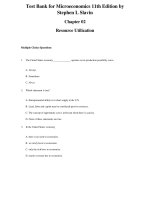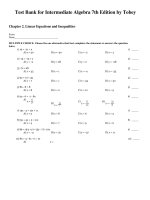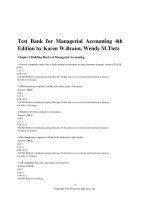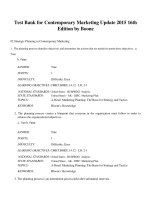link full download test bank for interpersonal relationships professional communication skills for nurses 6th edition arnold
Bạn đang xem bản rút gọn của tài liệu. Xem và tải ngay bản đầy đủ của tài liệu tại đây (277.12 KB, 9 trang )
Test Bank for Interpersonal Relationships Professional Communication
Skills for Nurses 6th Edition Arnold
Chapter 1: Theoretical Perspectives and Contemporary Issues
MULTIPLE CHOICE
1. Which of the following best describes the role of theory in the nurse-client
relationship?
a. Theory provides a common language.
b. Theory is the essence of the nurse-client relationship.
c. Theory varies with changes in health care delivery.
d. Theory guides nursing practice.
ANS: D
Theory provides nurses with a systematic way to view client situations and a logical way
to organize and interpret data. Incorrect answers: 1. Theory does provide a common
language for nurses, but this question asks what best describes the role of theory in the
nurse-client relationship. 2. Theory acts as a framework or guide; it is not the essence of
the relationship. 3. Theory provides a common framework for describing practice.
DIF: Cognitive Level: Comprehension
REF: Text Page Reference: p. 3 TOP:
Step of the Nursing Process: All phases
MSC: Client Needs: Safe, Effective Care Environment: Management of Care
2. Nurse Jones demonstrates the application of modern nursing theory when she:
a.
b.
c.
d.
Administers insulin to a client with diabetes
Assists a physician with a pelvic examination
Teaches a client techniques of self breast examination
Makes up a client’s bed
ANS: C
Modern nursing theory has broadened the definition of health with a strong emphasis on
disease prevention and health promotion. Incorrect answers: 1,2,4. These are all nursing
tasks, and modern nursing theory puts less emphasis on tasks and systems.
DIF: Cognitive Level: Application REF: Text Page Reference: p. 22 TOP: Step of
the Nursing Process: Implementation
MSC: Client Needs: Health Promotion and Maintenance
3. Nursing theory originated with which of the following nursing leaders?
a. Virginia Henderson
b. Martha Rogers
c. Dorothea Orem
d. Florence Nightingale
ANS: D
Theory development began when Florence Nightingale published her notes on nursing in
1859. Incorrect answers: 1,2,3. These nursing theorists began their theory development
from the 1940s onward.
DIF: Cognitive Level: Knowledge
REF: Text Page Reference: p. 3
TOP: Step of the Nursing Process: All phases
MSC: Client Needs: Management of Care
4. Virginia Henderson, Sister Callista Roy, Jean Watson, Dorothea Orem,
and Rosemary Parse are best known for:
a. Developing nursing theories
b. Linking theory to practice
c. Validating existing theory
d. Measuring clinical outcomes
ANS: A
These are some of the nursing leaders who developed the original theories of nursing.
Incorrect answers: 2,3,4. Linking theory to practice, validating existing theory, and
measuring clinical outcomes are modern practice based theories.
DIF: Cognitive Level: Comprehension
REF: Text Page Reference: p. 3 TOP:
Step of the Nursing Process: All phases
MSC: Client Needs: Management of Care
5. Nursing’s metaparadigm:
a.
b.
c.
d.
Helps bind nursing to other professions
Consists of three elements—person, health, and nursing
Makes nursing’s functions unique
Is a view of the immediate environment
ANS: C
Nursing’s metaparadigm is a worldwide view that makes its functions unique. Incorrect
answers: 1. Nursing’s metaparadigm distinguishes nursing from other professions. 2.
Nursing’s metaparadigm consists of four elements: person, environment, health, and
nursing. 4. It is a worldview.
DIF: Cognitive Level: Knowledge
REF: Text Page Reference: p. 4
TOP: Step of the Nursing Process: All phases
MSC: Client Needs: Management of Care
6. Nurse Green, when admitting Mr. Brown to the medical-surgical unit, asks him about
cultural issues. By doing this, Nurse Green is demonstrating use of the concept of: a.
Person
b. Environment
c. Health
d. Nursing
ANS: B
The concept of environment includes cultural and religious beliefs. Incorrect answers: 1.
Person is the recipient of care. 3. Health emphasizes well-being. 4. Nursing empowers
clients to achieve health.
DIF: Cognitive Level: Application REF: Text Page Reference: p. 5 TOP: Step of
the Nursing Process: Assessment
MSC: Client Needs: Psychosocial Integrity
7. Mary, a young mother, tells you “I’m worried because my son needs a blood
transfusion. I don’t know what to do, because blood transfusions cause
AIDS.” Which
central nursing concept is represented in this situation?
a. Environment
b. Caring
c. Health
d. Person
ANS: D
With the concept of person, nurses provide educational and emotional support to families.
Incorrect answers: 1. Environment refers to the internal and external context of the client.
2. Caring is an essential characteristic of the practice of nursing. 3. Health emphasizes the
equilibrium of all elements.
DIF: Cognitive Level: Application REF: Text Page Reference: p. 4 TOP: Step of
the Nursing Process: Implementation
MSC: Client Needs: Psychosocial Integrity
8. Performing a dressing change using sterile technique is an example of which
pattern of knowledge?
a. Empirical
b. Personal
c. Aesthetic
d. Ethical
ANS: A
Empirical knowledge is the scientific rationale for skilled nursing interventions. Incorrect
answers: 2. Personal ways of knowing allow the nurse to understand and treat each
individual as a unique person. 3. Aesthetic ways of knowing allow the nurse to connect in
different and more meaningful ways. 4. Ethical ways of knowing refer to the moral
aspects of nursing.
DIF: Cognitive Level: Comprehension
REF: Text Page Reference: p. 7 TOP:
Step of the Nursing Process: Implementation
MSC: Client Needs: Management of Care
9. The nurse-client relationship as described by Peplau:
a. Would not be useful in a short-stay unit
b. Allows personal and social growth to occur only for the client
c. Leaves the client with a greater sense of well-being
d. Describes phases of the relationship that are mutually exclusive
ANS: C
An important aspect of the nurse-client relationship is to leave the client with a greater
sense of well-being than before the encounter. Incorrect answers: 1. The nurse-client
relationship can be effective in even short interactions. 2. Growth occurs for both client
and nurse. 4. Phases can overlap and build on one another.
DIF: Cognitive Level: Knowledge
REF: Text Page Reference: p. 9
TOP: Step of the Nursing Process: All phases
MSC: Client Needs: Psychosocial Integrity
10. Which of the following is the purpose of the nurse-client relationship?
a. Foster spiritual well-being of the client
b. Foster understanding of the client’s health problem
c. Foster physical health of the client
d. Foster a partnership with the client
ANS: D
The purpose of the nurse-client relationship is to have a meaningful shared experience in
which personal/social growth occurs for both nurse and client. Incorrect answers: 1.
Spiritual well-being can result from a nurse-client relationship, but is not the purpose. 2.
This also can result from a successful nurse-client relationship, but it also is not the
purpose. 3. The nurse-client relationship can foster changes in health status and
wellbeing, but it is not the purpose.
DIF: Cognitive Level: Knowledge
REF: Text Page Reference: p. 9
TOP: Step of the Nursing Process: All phases
MSC: Client Needs: Psychosocial Integrity
11. According to Peplau, which of the following represents “exploitation,” the
third phase of the nurse-client relationship?
a. John Adams, RN, meets with the client, Mr. Jones, to obtain data
b. John Adams, RN, develops the nursing diagnosis, Anxiety about upcoming surgery
c. John Adams, RN, develops the goal to decrease Mr. Jones’ anxiety within two
sessions
d. John Adams, RN, teaches Mr. Jones to perform relaxation techniques
ANS: D
The exploitation phase uses resources to help the client resolve issues and learn new
coping strategies. Incorrect answers: 1. This is the orientation phase. 2. This is the
working phase. 3. This is the working phase.
DIF: Cognitive Level: Application REF: Text Page Reference: p. 9 TOP: Step of
the Nursing Process: Implementation
MSC: Client Needs: Management of Care
12. The identification phase of the nurse-client relationship:
a. Sets the stage for the rest of the relationship
b. Correlates with the assessment phase of the nursing process
c. Focuses on mutual clarification of ideas and expectations
d. Uses community resources to help resolve health care issues
ANS: C
The identification component of the working phase focuses on mutual clarification.
Incorrect answers: 1. The orientation phase sets the stage for the rest of the relationship.
2. The orientation phase correlates with the assessment phase. 4. This is the termination
phase.
DIF:
Cognitive Level: Knowledge
REF: Text Page Reference: p. 9
TOP: Step of the Nursing Process: Planning
MSC: Client Needs: Management of Care
13. Anger directed at the nurse by the family of a client newly diagnosed with cancer can
best be understood in the context of:
a. Martin Buber’s I-Thou relationship
b. Abraham Maslow’s hierarchy of needs
c. Carl Jung’s concepts of adult development
d. Sigmund Freud’s ego defense mechanisms
ANS: D
Freud identified ego defense mechanisms that a person uses to protect the self from
anxiety. One of these is the projection of anger. Incorrect answers: 1. In an I-Thou
relationship individuals respond in a mutually respectful manner. 2. Maslow describes
categories of needs that must be satisfied according to a hierarchy. 3. Jung’s concepts of
adult development help nurses understand changes in values that are important to older
adults.
DIF: Cognitive Level: Application REF: Text Page Reference: p. 10 TOP: Step of
the Nursing Process: Implementation
MSC: Client Needs: Psychosocial Integrity
14. Which of the following theorists viewed the professional’s relationship with the client
as a means to help the client grow and change?
a. Maslow
b. Rogers
c. Erikson
d. Beck
ANS: B
According to Carl Rogers, if the professional could provide a certain type of relationship,
the client would find the capacity to grow and change. Incorrect answers: 1. Maslow
focused on a hierarchy of needs. 3. Erickson talked about developmental stages. 4. Beck
focuses on cognitive distortions.
DIF: Cognitive Level: Knowledge
REF: Text Page Reference: p. 11
TOP: Step of the Nursing Process: All phases
MSC: Client Needs: Psychosocial Integrity
15. Nurse Smith wants to provide medication education to a group of clients diagnosed
with schizophrenia. It would be most helpful for nurse Smith to keep in mind the concepts of:
a.
b.
c.
d.
Freud’s transference and counter-transference
Rogers’ person-centered relationship
Maslow’s self-actualization
Erikson’s principles of personality development
ANS: B
Rogers’ concepts are applicable for nurse-client teaching formats. Incorrect answers: 1.
Transference and counter-transference may occur, but in providing education the most
helpful concepts are those of Rogers. 3. Self-actualization is the highest level of need
satisfaction; it would not be useful in providing medication education. 4. Erikson
describes four stages of the life cycle to help the person develop identity. These would
not be useful in providing psychoeducation.
DIF: Cognitive Level: Analysis
REF: Text Page Reference: p. 12
TOP: Step of the Nursing Process: Planning
MSC: Client Needs: Health Promotion and Maintenance
16. Which of the following statements about communication theory is true?
a. Primates are able to learn new languages to share ideas and feelings
b. Concepts include only verbal communication
c. Perceptions are clarified through feedback
d. Past experience does not influence communication
ANS: C
Feedback is necessary to confirm that participants have the same understanding of the
message. Incorrect answers: 1. Only humans are capable of learning new languages to
share ideas and feelings. 2. Both verbal and nonverbal concepts are important. 4. Past
experiences do influence communication.
DIF: Cognitive Level: Knowledge
REF: Text Page Reference: p. 17
TOP: Step of the Nursing Process: All phases
MSC: Client Needs: Psychosocial Integrity
17. In the circular transactional model of communication:
a. Systems theory concepts are included
b. People take only complementary roles in the communication
c. The context of the communication is unimportant
d. The purpose of communication is to influence the receiver
ANS: A
Systems theory concepts of feedback and validation are included. Incorrect answers: 2.
People take either symmetrical or complementary roles. 3. The context is very important.
4. This is the purpose in the linear model of communication.
DIF: Cognitive Level: Comprehension
REF: Text Page Reference: p. 17 TOP:
Step of the Nursing Process: All phases
MSC: Client Needs: Psychosocial Integrity
18. Feedback:
a. Occurs in some interactions
b. Involves only verbal responses
c. Does not include validation
d. Can focus on the feelings generated
ANS: D
Feedback can focus on content, relationship, feelings, or events. Incorrect answers: 1.
Feedback always occurs. 2. Feedback involves both verbal and nonverbal responses. 3.
Validation is a form of feedback.
DIF: Cognitive Level: Knowledge
REF: Text Page Reference: p. 17
TOP: Step of the Nursing Process: All phases
MSC: Client Needs: Psychosocial Integrity
19. As a nursing student you are expected to engage in therapeutic communication with
clients. Which of the following statements represents therapeutic communication
when a student discovers a client crying in bed?
a. “Hi, Joe; I am the nurse who will be doing your treatments today.”
b. “Hi, Joe; will you listen to me so I can help you get better?”
c. “Hi, Joe; this is what is going to happen during surgery.”
d. “Hi, Joe; can we talk about what seems to be bothering you?”
ANS: D
This statement is goal-directed. Its purpose is to promote client well-being. Incorrect
answers: 1. This communication is a statement of fact and it ignores the client’s
emotional needs. 2. This is not goal-directed and does not involve mutuality. 3. This
communication is simply one-way. It does not engage the client in a therapeutic manner.
DIF: Cognitive Level: Application REF: Text Page Reference: p. 18 TOP: Step of
the Nursing Process: Assessment
MSC: Client Needs: Psychosocial Integrity
20. The current focus of the health care delivery system can be best described by: a. Telehealth
b. The medical model
c. Nursing’s metaparadigm
d. Capitated health care
ANS: C
The current focus of health care delivery is on using a public health framework rather
than a traditional model. Nursing’s metaparadigm, with the emphasis on the
interrelationship between person and environment, stresses health promotion and disease
prevention. Incorrect answers: 1. Tele-health is part of the current system, but not the
focus. 2. The medical model treatment of disease was a past focus of health care. 4.
Capitated health care focuses on resource allocation.
DIF: Cognitive Level: Comprehension
REF: Text Page Reference: p. 18 TOP:
Step of the Nursing Process: All phases
MSC: Client Needs: Health Promotion and Maintenance









